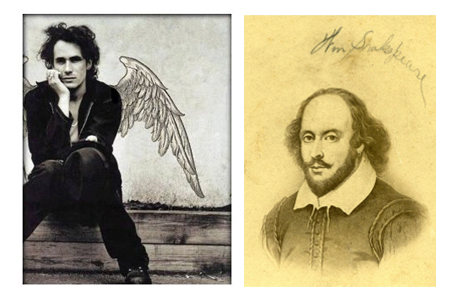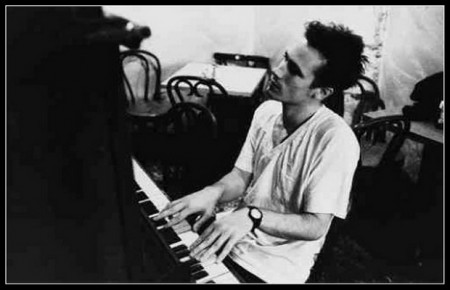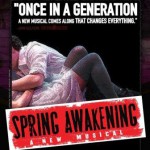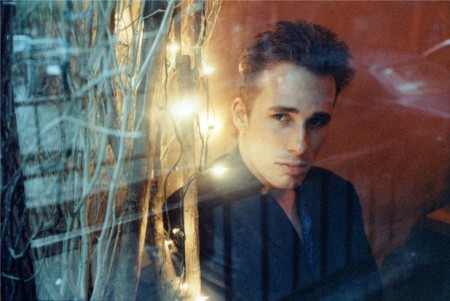Interview: The minds behind the new Jeff Buckley/Shakespeare musical

In a few weeks, the new theatre production of The Last Goodbye will make its highly anticipated world debut at the Williamstown Theatre Festival (August 5th – 20th). As I wrote back in April, this new creation takes Shakespeare’s “Romeo & Juliet” and weaves fifteen songs from my beloved Jeff Buckley throughout it.
Under the summer stars, young actors and a rock band will put their hearts into letting Jeff’s music speak into the story of the ill-fated lovers we know so well. It’s also down the road from that Wilco-curated Solid Sound Festival. So yeah, why aren’t you going?
Even though I babble incoherently from lack of experience when talking about theatre, I was fortunate to talk to both the director Michael Kimmel, who first conceived of this pairing and worked with Jeff’s mom Mary Guibert to make it happen, and Kris Kukul, who is the musical director and actually wove the songs into the completed creation. It was fascinating to talk to them both, and I even got tears in my eyes at one point as Michael talked about why this play makes sense with this musician, this man. I think they get it. I’m excited to see where this production goes.

THE LAST GOODBYE: DIRECTOR – MICHAEL KIMMEL
Fuel/Friends: I understand that the genesis for this whole melding of Shakespeare and Jeff Buckley occurred in your mind. Tell me about that.
Michael Kimmel: A little over three years ago I had this idea. I’ve always been a fan of Jeff’s music, I’ve had Grace for years and years. I was directing a reading of Othello and I was on my way to a rehearsal, and “Forget Her” came on my iPod. I started to hear this conversation while the song was playing, “She was heartache from the moment that you met her.” I heard these two voices in Jeff’s voice, a back and forth in his lyrics, seeming to really be fighting. I had this moment where I said, “Wow, that really sounds like Romeo and Benvolio talking about Rosaline.”
Forget Her – Jeff Buckley
It was a buzzing in my head, so I went back and found the play and opened it up and Benvolio says to Romeo, “Be ruled by me, forget to think of her.” And it wasn’t just that amorphous connection, more importantly that conversation I heard was an active process — and what we ended up with was the songs taking their place in the scenes in a very interesting and cool way.
F/F: So it started with that song, and went from there?
MK: Well once that happened I went through that whole doubt process of, “Well there’s no way this would work with the rest of his music!” I spent three months combing through everything that I had access to, Sin-é, Mystery White Boy, My Sweetheart The Drunk, all the stuff that’s readily available, and came up with a first pass of songs that I thought really fit well. At that point, I pursued getting in touch with Sony Music to see if this was even going to be possible before I got too far down the road. They came back to me and said “Mary Guibert [Jeff's mom, who owns all the rights to his music] really wants to talk to you about this.” We ended up having a phone conversation where I told her what the idea was. She was really interested, and I think a little skeptical.
A few months later in mid-2008, she ended up being in New York, and I took her down to a theatre in downtown New York, and I sat on the stage with a copy of Romeo and Juliet and I just had a friend on an iPod, and I took her through the whole story and how the music fit, and then we went out for a three hour dinner, and she was really really interested. We left that night with her wanting to see more, and we decided that I would put up a concert reading so that she could get a sense of the whole thing.
Lauren Fitzgerald from Williamstown introduced me to Kris and we endeavored to put this concert reading together for Mary to see it, and we only opened it up to the Jeff Buckley fan club and a couple of industry people. We came out of there and she saw it laid out and she completely got behind us. At the same time, the person who programs this venue called Joe’s Pub, the cabaret space of the public theatre, ended up seeing our reading and wanted to program us on their stage. So we also ended up doing three concert readings at Joe’s Pub last May, and that was our first true public presentation of the show. I describe those readings as basically a rock concert with a little bit of a play thrown in, you know, no costumes, no sets, just a cast of fourteen and a live band.
F/F: Is there a clear time period in your version? Modern times? Shakespearean times?
MK: It’s definitely set in modern times, in a modern version of “Verona,” and by Verona I mean a landscape that takes its cues from downtown New York of now. The actors are mostly in their 20s.
F/F: Do you find that most of the actors come to it knowing Jeff Buckley better or Shakespeare better? Or both?
MK: Casting is tricky, because it’s not musical-theatre music, and we’re not going to make his music something that it’s not – the rawness and the passion of it has got to stay for this to make sense. So finding people who can connect in that way is always a challenge, because it’s a different kind of performer than you would necessarily find in a typical “musical.” Sure, a lot of the people we’ve been working with are huge Jeff devotees – our Romeo is like a Jeff historian and has been hugely influenced by Jeff’s music. But that’s not to say that it’s not also equally great to find someone who is just being introduced to his music. I mean, the first time I heard Grace I said, “Wow, someone actually put a voice to that!” Seeing that in someone else is really gratifying.
F/F: How did it come to premiere at the Williamstown Theatre Festival?
MK: Well, the Joe’s Pub shows sold out well in advance and there were a lot of industry folks there. We spent a lot of time after those performances meeting with people and trying to look for the RIGHT path for it to take. It’s always been at the forefront for me, and I know for the others as well – getting this right.
F/F: What does that look like for you, this “getting it right”?
MK: It’s always constantly evolving and changing, from our first concert reading to Joe’s Pub, to now, it looks different. Now with the addition of choreography and getting it up on its feet, I think the way that it’s done right is that you walk out of the performance feeling re-invested in a story that’s been known for hundreds of years, and the music is the way in for that. And not only being invested in it, but seeing it in a different way. And you’ll probably appreciate this more than most, but I always say that there aren’t any halfway Jeff Buckley fans – they are a committed group.
F/F: It must be a good feeling for you to have the fans so strongly behind this, understanding what you are trying to do.
MK: I hear they are endeavoring to make a movie of his life, but where I feel that people can get behind us is that I am not interested in telling the story of Jeff’s life. What I am interested in is telling the story that I think he was trying to tell, and I think there is a big difference. It is a Herculean task. When I was able to start piecing all this music together, you really see a narrative, and it mirrors a lot of the narrative of Romeo and Juliet. I’m not the person to tell the story of his life. I am better suited to tell the story that I think he wanted to tell, the one that is suited to the stage.
What I learned from talking to fans after the readings is that people have a profound attachment to Jeff’s music that can be traced back to a very specific moment, whether it’s heartbreak or first love, and people have been sharing all their stories with me. That attachment and identification with his music, the intensity, I think is what makes it work so well. It connects those pieces to the story of these two kids, and attaches a sound to it that restores something I think the story has lost.
F/F: Right, because I think to a lot of people, Shakespeare just evokes high school English class, and that’s about it.
MK: Yeah! And I teach too at Fordham University in New York, and I teach it from a theatre perspective, not a literary perspective, and everyone’s impression is often just, “eh.” When you go back to the play, one thing that is always really interesting about Romeo and Juliet is that at the beginning of the play, Shakespeare ruined the ending. He tells you exactly how it is going to end. But what really appeals to me is that the ending is an afterthought, and it’s really the journey there that’s important – which also mirrors Jeff’s life to me.
Whenever anyone mentions Jeff now, it’s always, “died tragically. Died tragically.” For me, the death is an afterthought. It’s about the journey and this body of music that he left us and his evolution as an artist that matters. That’s the important part of it.
So when I say re-investing in the story, the idea is that if we do our job right, this time you hope that somehow it works out differently. And of course, after seeing umpteen productions of this play, there’s a sense of tragedy that pervades the whole play from the beginning – God, the weight of what happens at the end kind of carries through. For us though, it’s funny, and it’s messy, and it’s intense, and gritty and dirty and fumbling and insecure, but it’s never sad. It’s hopeful, you know?

KRIS KUKUL, MUSICAL DIRECTOR
Fuel/Friends: So were you a fan of Jeff Buckley’s music before this production? What’s been your connection with him?
Kris Kukul: I knew him a little bit. My previous roommate was a huge fan of his, she was the manager of the Club Fez in New York, and she would listen to him all the time. I knew some of his songs, but nothing like her – I got really familiar with him actually because of the show.
F/F: So has she seen the show?
KK: She’s obsessed with it. It’s amazing. She actually did know Jeff Buckley when he would play in New York. Folks like her are some of our biggest supporters. There’s always that hesitation before they see it, you know, like – “Wait a minute… is this going to sound like Cats??” I’m pleased with the way we are able to honor the music in this production, and tell the story with different voices.
F/F: Did you think it to be a daunting project, or exciting? Or both? I’m sure you became aware pretty quickly of the cult of Jeff Buckley fans.
KK: I wasn’t so much worried about how people were going to take it, it was more just trying to take a body of work and adapt it from the voice of one person who sings these fifteen songs. And to make it work for men, for women, for groups, for characters in this story. I think because of the strength of his lyrics, it just worked so well, and it wasn’t that difficult. From the very beginning, it was just so clear how well it worked together.
F/F: Explain to me what a music director does. I know that’s a dumb question, but help the non-theatre girl.
KK: For this production, I’ve done the orchestration and arrangements, and adapting the music, as well as the other side — teaching the singers the music, teaching the band the music. I conduct the band, and we don’t have any keyboards yet but if we put some in I might play that.
Jeff’s songs in the production aren’t exactly the same as they are on the album in terms of structure, there are a couple where songs are weaved together. Like “Lover, You Should Have Come Over” and “I Know We Could Be So Happy Baby” is turned into a duet, with Juliet singing the former and Romeo the latter. There’s a lot of group singing, the ensemble plays a big part so there is a lot of harmony added in that regard, added vocal arrangements. And I just had to make the songs fit the scenes, the dialogue gets weaved in and out.
F/F: So your job was taking the songs from the way Jeff recorded them, and not changing them drastically, but weaving them into the Shakespeare.
KK: Yeah – there are some of his songs that are like eight, twelve, fifteen minutes long, so we didn’t always use the whole songs, that would be a decision of mine and Michael’s, if we left out a verse, or chose to repeat something. Like “Dream Brother,” for example, is used in the dance where Romeo meets Juliet, and Mercutio sings the song as the scene progresses. So Mercutio sings a verse in a scene with Romeo and Juliet, then there’s another verse in a scene with Tybalt, and then everyone shows up at the party and the whole group sings together: “Don’t be like the one who made me so old, don’t be like the one who left behind his name…”
Then we weave in the line from “I Woke Up In A Strange Place” about “fate is gonna find your love” gets weaved throughout the whole play. So in the midst of the dance, then that line will come back in.
F/F: Ooh, that gave me chills.
KK: Yeah! I mean, it’s weird and uncanny how well the lyrics fit. Also in “Eternal Life,” which is the big song at the end of Act One where Mercutio dies, there’s the line about “there’s a flaming red horizon that screams our names.” That line is also used throughout the entire play, it’s in there like fifteen times. That one line sums up what these young people are heading towards.
 F/F: The only other theatre adaptation like this that I’ve ever written about on Fuel/Friends is Spring Awakening, when I went to an interview roundtable with Duncan Sheik who penned all those songs. Now, that seems like a similar idea of taking a very old play and trying to set it to contemporary music. Do you see any connections with what you are doing here?
F/F: The only other theatre adaptation like this that I’ve ever written about on Fuel/Friends is Spring Awakening, when I went to an interview roundtable with Duncan Sheik who penned all those songs. Now, that seems like a similar idea of taking a very old play and trying to set it to contemporary music. Do you see any connections with what you are doing here?
KK: I think by definition they actually are similar, although I haven’t seen Spring Awakening, sadly! I know lots of the songs and like them actually, but I think with Spring Awakening is much more of a concept, in terms of there’s the play and then the songs are actually in a separate universe where they are internal thoughts, as opposed to a traditional musical where the songs are actually part of the story, which is what The Last Goodbye is using the songs for. In Spring Awakening, they had this device where every time people would sing they would pull out a handheld microphone, so that the singing became part of a different, expressionistic universe. That play is about sexual repression, so they would sing about all the things they couldn’t talk about in life. So that actually lends itself to that concept very well. Ours is just kids in love.
Jeff’s lyrics are also incredibly poetic, so Shakespeare meshes well with this highly beautiful, poetic lyricism. He’s much more of a poet than just a lyricist.
We’re not beholden to the original Shakespeare text either, a lot of things are moved around. In the play, as in all Shakespeare, there are these big soliloquies, and so in this production those soliloquies are what have become the songs and where we’ve placed them.
F/F: What kind of band do you have playing with this show?
KK: There is drums, bass, two guitars, and a violin and cello. Possibly some keys, if we decide to put piano in the songs – but that might tip it too much into musical theatre land, which we don’t want to do. Jeff rarely used piano in his songs, there’s only a few, like, “Everybody Here Wants You” where he uses just those two accent bars. I don’t want this to be American Idiot, I don’t want this to be Spring Awakening.
F/F: “Everybody Here Wants You” is among my favorite Jeff Buckley songs, so damn sexy. How does that appear in the play?
KK: Oh, that’s in that scene after the party on the balcony song, and Romeo sings it to Juliet, and then she joins in. Everyone is looking for her and she’s out making googly eyes with Romeo. But yeah, it’s such a great song, it’s like R&B!
F/F: How involved was Jeff’s mom in the process?
KK: She’s been at every performance, she holds the rights so she had a lot of say in everything, but she’s been totally supportive from the beginning. I mean — she suggested a viola once, but that’s been the extent, she’s been happy with the choices we’ve made and how the songs sound.
F/F: How does the choreography work with the music?
KK: We have Sonya Tayeh [editor’s note: the one choreographer I have actually heard of!]. She’s a judge on So You Think You Can Dance, the one with the mohawk, and she is an amazing choreographer. We tried very hard to have non-conventional choreography, we didn’t want a lot of Broadway in it, we wanted weird, organic, avant garde work, and she absolutely did that. She’s incredible and crazy and amazing, but that’s what we wanted. Really young, hip movement.
F/F: So a lot of people without a background in theatre, like me, experience a kind of a disconnect when they go to musicals, because all of a sudden everyone is doing jazz hands and bursting out into song [reference]. Do you think non-theatre audiences will feel that way at all with The Last Goodbye?
KK: We’ve economized it, and the actors are young and sexy and rockstars, and it just makes sense. I don’t think people will have that disconnect, at all. But that being said, my mom is probably not going to like it. It’s loud. But it’s not a vaudeville play or a waltz scene. At the end of the day, it’s Jeff’s songs.




 Name: Heather Browne
Name: Heather Browne